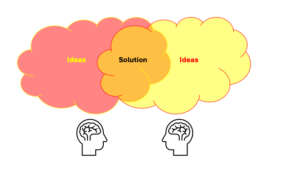
I was listening to the No Way Out podcast hosted by Brian Rivera and Mark McGrath talking to Johan Ivari and Annette Nolan about teamwork and they briefly mentioned the distinction between Synchronization and Harmonization and a light bulb went off.
I have long been interested in coordination both in relation to perceptual motor skill and in relation to teamwork and polycentric control. However, in thinking about coordination I tended to think primarily about the need to synchronize activity. In terms of motor skills, this was about synchronizing muscle assemblies, and in organizations, it was about synchronizing actions across and within teams. But I had not thought to frame coordination in terms of harmonization. Though it was obvious that high functioning teams needed to 'blend' their skills together in ways not fully captured by the term synchronization.
Synchronization emphasizes the timing of activities. For example, in making a pass to a teammate (e.g., in basketball, soccer, or American football) the release and pace of the ball has to be in synch with the motions of the receiver.
Harmonization, however, is not just about timing, but it is about blending diverse individuals to create a satisfying result. For example, this might reflect the ability of teammates to move together to create the opportunity for a successful pass. In group problem solving - success can often depend on the ability of people to share diverse experiences in order to discover/create an innovative solution. Harmonization seems to be consistent with other descriptions of team functioning such as 'building common ground' or 'organizational sensemaking.'
Now in thinking about polycentric control I suggest that synchronization is a necessary, but not sufficient requirement for successful coordination. In addition, effective polycentric control requires harmonization. That is, it requires that individuals blend their skills and their diverse perspectives in ways that complement the skills and perspectives of their teammates AND that satisfy the demands of their domains of operation.
To be clear, harmonization, is not an answer. It's practical meaning can only be defined relative to the demands of situations or domains of operation. Rather, it is just a subtle, but perhaps important shift in how to frame questions about coordination. Maybe this is just word play - but I find comfort in having a word that fills in some of the gaps with respect to understanding how teams work.

Yes, really. It was and with me. Let's discuss this question. Here or in PM.
Send me a direct message on LinkedIn if you want to explore this further.